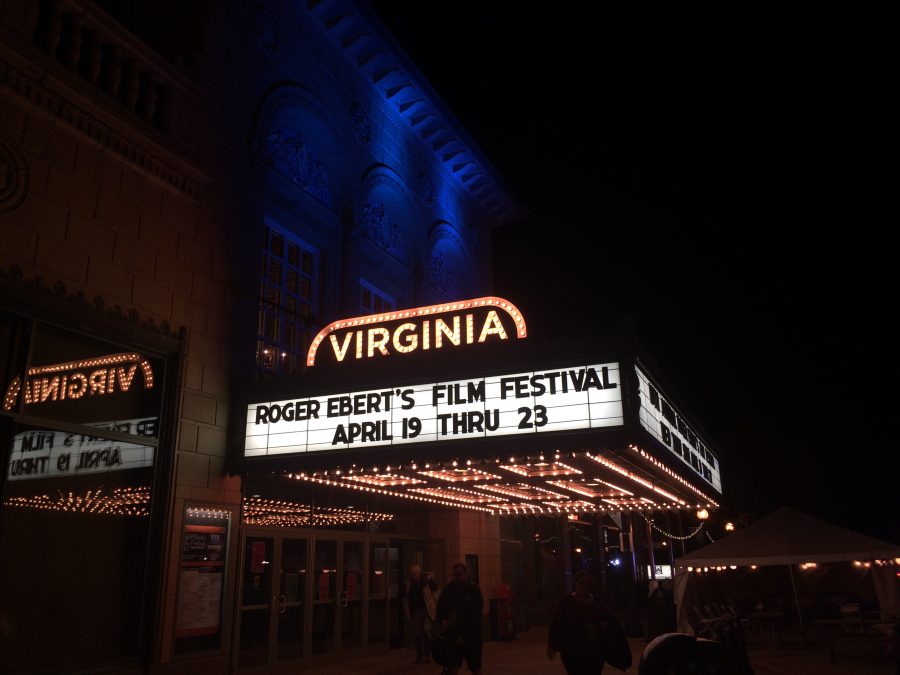14 Most Memorable Moments from Isabelle Huppert
Outside the Virginia Theater on Friday, April 21. The 19th annual Roger Ebert Film Festival runs from April 19 – 23.
Apr 22, 2017
The moment Isabelle Huppert stepped onto the Virginia Theatre stage Friday evening, moviegoers gave the French actress a standing ovation.
She attended Ebertfest on the third day of the festival for the screening of her 2016 thriller “Elle.” Huppert, who has been in more than 100 films since the early 1970s, won a Golden Globe and was nominated for an Academy Award for her performance in the film.
“Elle” follows Michèle Leblanc, a successful businesswoman, while she seeks revenge against the masked man who raped her. The film was based on the novel “Oh…” by French novelist Philippe Djian and was directed by Dutch director Paul Verhoeven.
Michael Barker, co-founder and co-president of Sony Pictures Classics, led a 50-minute Q&A with the actress after the film screening. Here is what Huppert had to say about the film — and the art of film — in the post-screening discussion. Responses were edited for clarity and length.
- “For me, moviemaking is always about the present time, and in this movie even more so.”
- “I guess you don’t prepare for such a role because if you prepare, it means that in advance you are going to orient the performance toward one direction rather than to the other. … I think to achieve something, it’s precisely by not preparing; otherwise, if you prepare something, you tend to weaken the whole process, and you tend to make it less rich.”
- “No, [Verhoeven] never said anything — I mean, hello and goodbye in the evening — because he didn’t have to. It wasn’t necessary. You know, to do movies, it’s kind of a language in itself, and you don’t need explanations. It certainly goes without any attempt of psychological explanations precisely because it’s so always contrasted, so always ambiguous and complex.”
- “I think what attracts me is the unsentimental aspect of the character. … It’s a non-emotional character, although there was a kind of emotion, so it’s completely away from this kind of parameters that most of fictional roles — not most, but many of fictional roles — are often screened. It’s defined in a very different way, so it’s not emotional, it’s not psychological, it’s just very much alive, I believe.”
- “In most fictions, when it’s too psychological or too emotional, it might be sometimes pleasant to watch on the screen, but it’s so far from reality. What I was interested in was to try to reflect something as truthful as possible.”
- “Some aspect [of the character, Michèle] is me, some aspect is not me at all. I would never live alone in such a big house, you know. I’m much too scared. No, she has a lot more bravery than I have, maybe the sense of humor [is] from me, the way she reacts to all these situations and the way she does on screen, that comes from me.”
- “No, I had no dreams. I still don’t have dreams. … I knew that I wanted to have certain type of roles, which were central to the story. Sometimes they were fragile — not victims, but say weak characters. I wanted them to be the center of the story; that was my little feminism to me. I knew that from the beginning, but you can’t really figure out what’s going to be your life, what’s going to be your work and people you’re going to be meeting. I had so many extraordinary encounters in my life — some of them have been at random, some maybe where I kept from me. It’s life.”
- “Well, I don’t think that [directors] see me as their muse. They just see me, which that’s how any director in the world should watch an actor or the actress. I think, in most of these films, I feel like I was really watched and seen, you know, to really to an extreme degree, to the degree that allowed me to occupy such a large space in the film and to really be myself. It’s not so usual, not to be a character, but just to be a person, which happens to be me.”
- “Too often, people think that people should be nice, characters should be nice. It’s nothing about being nice; it’s just more interesting just about being true. Sometimes it’s nice, sometimes it’s not nice, and it’s not the characters which are nice or not nice, it’s the situations that they go through that sometimes are nice and sometimes are not nice. It’s a different way to see fiction, with no obligation to be nice or to be sympathique or whatever.”
- “[‘Elle’ is] not an easy film. It’s not some film that takes you by the hand and says hello to you.”
- “[The cat in ‘Elle’] was a great cat. He was a — comment on dit — a trained cat. I never worked with a trained cat before. When he was asked to jump into my arms 25 times, he would do it. I’d never seen that before.”
- “The film [‘Elle’] speaks by itself. You are not being pushed by the film or pushed. The film generates its own strength, its own energy, its own mechanism.”
- “I think that cinema is such a powerful energy. It generates its own strength, and so you don’t even have to think about it, just do it.”
- “[Elle] raises more questions than gives answers, like most interesting films most of the time — or books.”






